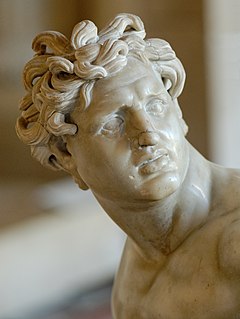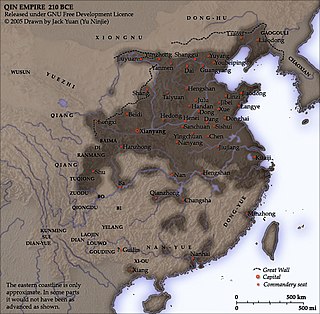Related Research Articles
Common Era (CE) is one of the year notations used for the Gregorian calendar, the world's most widely used calendar era. Before the Common Era (BCE) is the era before CE. BCE and CE are alternatives to the Dionysian BC and AD notations respectively. The Dionysian era distinguishes eras using the notations BC and AD. The two notation systems are numerically equivalent: "2020 CE" and "AD 2020" each describe the current year; "400 BCE" and "400 BC" are each the same year. The Gregorian calendar is used throughout the world today, and is an international standard for civil calendars.

The Celts are a collection of Indo-European peoples in parts of Europe and Anatolia identified by their use of the Celtic languages and other cultural similarities. The history of pre-Celtic Europe and the exact relationship between ethnic, linguistic and cultural factors in the Celtic world remains uncertain and controversial. The exact geographic spread of the ancient Celts is disputed; in particular, the ways in which the Iron Age inhabitants of Great Britain and Ireland should be regarded as Celts have become a subject of controversy. According to one theory, the common root of the Celtic languages, the Proto-Celtic language, arose in the Late Bronze Age Urnfield culture of Central Europe, which flourished from around 1200 BC.
Year 121 (CXXI) was a common year starting on Tuesday of the Julian calendar. At the time, it was known as the Year of the Consulship of Verus and Augur. The denomination 121 for this year has been used since the early medieval period, when the Anno Domini calendar era became the prevalent method in Europe for naming years.

The Zhou dynasty was a Chinese dynasty that followed the Shang dynasty and preceded the Qin dynasty. The Zhou dynasty lasted longer than any other dynasty in Chinese history. The military control of China by the royal house, surnamed Ji, lasted initially from 1046 until 771 BC for a period known as the Western Zhou and the political sphere of influence it created continued well into the Eastern Zhou period for another 500 years.
Year 206 BC was a year of the pre-Julian Roman calendar. At the time it was known as the Year of the Consulship of Philo and Metellus. The denomination 206 BC for this year has been used since the early medieval period, when the Anno Domini calendar era became the prevalent method in Europe for naming years.

Year 210 BC was a year of the pre-Julian Roman calendar. At the time it was known as the Year of the Consulship of Marcellus and Laevinus. The denomination 210 BC for this year has been used since the early medieval period, when the Anno Domini calendar era became the prevalent method in Europe for naming years.
Year 399 BC was a year of the pre-Julian Roman calendar. At the time, it was known as the Year of the Tribunate of Augurinus, Longus, Priscus, Cicurinus, Rufus and Philo. The denomination 399 BC for this year has been used since the early medieval period, when the Anno Domini calendar era became the prevalent method in Europe for naming years.
Year 247 BC was a year of the pre-Julian Roman calendar. At the time it was known as the Year of the Consulship of Metellus and Buteo. The denomination 247 BC for this year has been used since the early medieval period, when the Anno Domini calendar era became the prevalent method in Europe for naming years.

Qin Shi Huang was the founder of the Qin dynasty and the first emperor of a unified China. From 247 to 221 BC he was Zheng, King of Qin. He became China's first emperor when he was 38 after the Qin had conquered all of the other Warring States and unified all of China in 221 BC. Rather than maintain the title of "king" borne by the previous Shang and Zhou rulers, he ruled as the First Emperor (始皇帝) of the Qin dynasty from 221 BC to 210 BC. His self-invented title "emperor" would continue to be borne by Chinese rulers for the next two millennia.

Legalism or Fajia is one of Sima Tan's six classical schools of thought in Chinese philosophy. Literally meaning "house of administrative methods" or "standards/law" (fa), the Fa "school" represents several branches of what have been termed realist statesmen, or "men of methods", who played foundational roles in the construction of the bureaucratic Chinese empire, with their teachings coming to temporary overt power as an ideology with the ascension of the Qin Dynasty. In the Western world, the Fajia has often been compared to Machiavellianism, and considered akin to an ancient Chinese philosophy of Realpolitik, emphasizing a realist project of consolidating the wealth and power of the state and its autocrat, with the goal of achieving order, security and stability. With their close connections to the other schools, some Legalists would go on to be a major influence on Taoism and Confucianism, and legalism remains highly influential in administration, policy and legal practice in China today.
The history of calendars, that is, of people creating and using methods for keeping track of days and larger divisions of time, covers a practice with ancient roots.

Shang Yang, also known as Wei Yang and originally surnamed Gongsun, was an ancient Chinese philosopher, politician and a prominent legalist scholar. Born in the Zhou vassal state of Wey during the Warring States period, he was a statesman, chancellor and reformer serving the State of Qin, where his policies laid the administrative, political and economic foundations that strengthened the Qin state and would eventually enable Qin to conquer the other six rival states, unifying China into a centralized rule for the first time in history under the Qin dynasty. He and his followers contributed to the Book of Lord Shang, a foundational philosophical work for the school of Chinese legalism.

Xun Kuang, also widely known as Xunzi, was a Chinese Confucian philosopher and writer who lived during the Warring States period and contributed to the Hundred Schools of Thought. A book known as the Xunzi is traditionally attributed to him. His works survive in an excellent condition, and were a major influence in forming the official state doctrines of the Han dynasty, but his influence waned during the Tang dynasty relative to that of Mencius.

Ancient Greek literature is literature written in the Ancient Greek language from the earliest texts until the time of the Byzantine Empire. The earliest surviving works of ancient Greek literature, dating back to the early Archaic period, are the two epic poems The Iliad and The Odyssey, set in an idealized archaic past today identified as having some relation to the Mycenaean era. These two epics, along with the Homeric Hymns and the two poems of Hesiod, Theogony and Works and Days, comprised the major foundations of the Greek literary tradition that would continue into the Classical, Hellenistic, and Roman periods.

Xianyang is a prefecture-level city in central Shaanxi province, situated on the Wei River a few kilometers upstream (west) from the provincial capital of Xi'an. Once the capital of the Qin dynasty, it is now integrated into the Xi'an metropolitan area, one of the main urban agglomerations in western China, with more than 7.17 million inhabitants, its built-up area made of 2 urban districts was 945,420 inhabitants at the 2010 census. It has a total area of 10,213 square kilometres (3,943 sq mi). Xianyang is home to the main campus of Northwest A&F University (NWAFU), one of the world's top universities in "Agriculture Science" related-fields and a member of "Project 985" club which is an organization of 39 reputable universities in China.

The Ban Liang was the first unified currency of the Chinese empire, introduced by the first emperor Qin Shi Huang around 210 BC. It was round with a square hole in the middle. Before that date, a variety of coins were used in China, usually in the form of blades or other implements, though round coins with square holes were used by the State of Zhou before it was extinguished by Qin in 249 BCE.

Literature broadly is any collection of written work, but it is also used more narrowly for writings specifically considered to be an art form, especially prose fiction, drama, and poetry. In recent centuries, the definition has expanded to include oral literature, much of which has been transcribed. Literature is a method of recording, preserving, and transmitting knowledge and entertainment.
Deng Xi was a Chinese philosopher and rhetorician who was associated with the Chinese philosophical tradition School of Names. Once a senior official of the Zheng state, and a contemporary of Confucius, he was actually China's earliest renowned lawyer, teaching the people word play in lawsuits. The Zuo Zhuan and Annals of Lü Buwei critically credit Deng with the authorship of a penal code opposing and twisting that of the more Confucian Zichan. Arguing over forms and names, Deng is cited by Liu Xiang as the originator of the "Legalists" and Logicians Xing-Ming principle judging names and realities (ming-shih), likely making him an important contributor to both Chinese philosophy and the foundations of Chinese statecraft.
The date of birth of Jesus is not stated in the gospels or in any historical reference, but most theologians assume a year of birth between 6 and 4 BC. The historical evidence is too incomplete to allow a definitive dating, but the year is estimated through three different approaches: (A) by analyzing references to known historical events mentioned in the nativity accounts in the Gospels of Luke and Matthew, (B) by working backward from the estimation of the start of the ministry of Jesus, and (C) astrological or astronomical alignments. The day or season has been estimated by various methods, including the description of shepherds watching over their sheep.
References
- ↑ "Boule - ancient Greek council". Encyclopedia Britannica. Retrieved 4 June 2018.
- ↑ Orosius, Paulus (2010). Seven Books of History Against the Pagans. Liverpool University Press. p. 81. ISBN 9781846312397.
- ↑ "Cádiz - Spain". Encyclopedia Britannica. Retrieved 4 June 2018.
- ↑ Crystal, David (2004). The Penguin encyclopedia . Penguin Books. p. 367.
- ↑ Qin and Han Dynasty: Catatan Kisah Sejarah Dua Dinasti (in Indonesian). Gramedia Pustaka Utama. 2013. p. 169. ISBN 9789792290936.
- ↑ "School of Names > Deng Xi's Exploits (Stanford Encyclopedia of Philosophy)". plato.stanford.edu. Retrieved 4 June 2018.